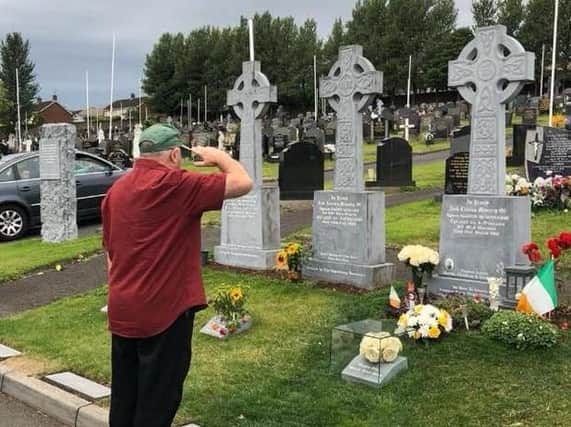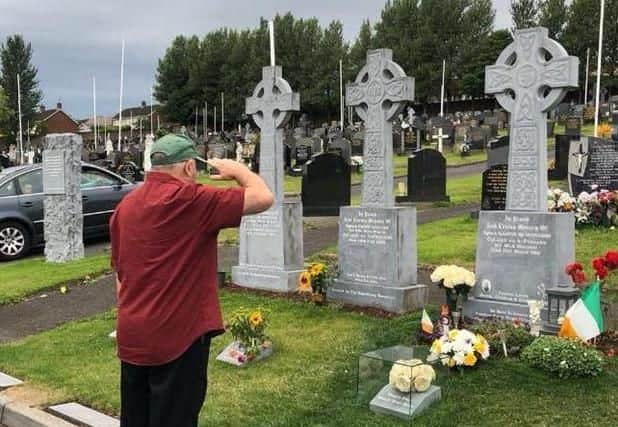Video: Anti-apartheid icon Ronnie Kasrils salutes friend and comrade Martin McGuinness


Mr. Kasrils, a founding member of MK (uMkhonto we Sizwe), the armed wing of the African National Congress (ANC), who served in the Nelson Mandela and Thabo Mbeki administrations of a free South Africa in the 1990s and 2000s, had been invited to the city by Gasyard Féile 2018.
Addressing an audience in the Gasyard Centre the 80-year-old former freedom fighter said: “It’s wonderful to be in Derry. I’ve been looking forward to coming here to meet you and I would like to thank my friends for the invite. There are lots and lots of memories that I have of past visits and especially of staying in this fine city of Martin McGuinness.
Advertisement
Hide AdAdvertisement
Hide Ad“We laid a wreath to him just this afternoon. He was a great and wonderful human being. We will remember him.”


The life-long activist was in town to read from his latest book, a blistering insider’s exposé of the recently resigned former South African president Jacob Zuma’s controversial rise to power.
In conversation with the Sinn Féin MLA, Raymond McCartney, Mr. Kasrils held forth on a wide range of subjects and gave an insight into a political philosophy that was forged over many years of armed struggle and political activism.
Mr. Kasrils recalled the strong sense of injustice he felt upon witnessing the ill-treatment of Johannesburg’s black population when he was growing up there during the Second World War period.
Advertisement
Hide AdAdvertisement
Hide Ad“I was appalled at the way ostensibly decent white people, neighbours and relatives, dealt with the black servants, at seeing blood spilt in the city streets by white thugs attacking a black man because they didn’t like the way he was dressed,” he recounted.
“I saw that as a kid. I saw policemen beating young black urchins on cold winter nights when they had come to the cinema to beg for a few cents.
“I’m sure my friends were as revolted. I asked my mother: ‘Is this what’s happening in Nazi Germany?’
“This simple woman replied: ‘Well [in Nazi Germany], people are being slaughtered and sent to concentration camps. We don’t have that in South Africa but, young Ronald, it starts that way’.”
Advertisement
Hide AdAdvertisement
Hide AdMr. Kasrils acknowledged being a product of a privileged white upbringing and the apartheid state education system of the 1940s and 1950s.
He reached for a local Derry metaphor when describing his coming to political consciousness in his late teens.
“When I left school, I reached my hands out across the divide as the famous symbol of Derry does and that’s true.
“It’s a symbol that is so universal and the hands were there to take and grasp me and they were the black hands of young writers and poets and musicians, including some of the young black women, and this was all utterly illegal. Just drinking with black people.”
Advertisement
Hide AdAdvertisement
Hide AdMr. Kasrils worked as a scriptwriter for a time but it was not long before he was singled out for his political views. It was the Sharpeville massacre of March 21, 1960, however, that propelled him headlong into a life of revolutionary activism and, ultimately, led him to join both the South African Communist Party (SACP) and the ANC.
“Sharpeville hit the country like a thunderclap,” is how he remembers it. He quickly realised that the endless discussions about freedom and Jean-Paul Sartre, such as those common among the bohemian circle in which he moved, were inadequate.
“‘B******s,’ I said. ‘I won’t be free unless I actually stand up and come to the fore, be counted and act’. You had to put the mind and action together to change the world. That’s how it was. It didn’t take the young white boy very long to realise that the black movement of South Africa was absolutely ready and prepared to accept and embrace him.”
On his later role as an MK commander in South Africa and in Mozambique, where the organisation had a relatively secure rear base, he said: “Struggle transforms one. I like to think it helped to build and forge my character and make me a better human being and, when I saw others who were so engaged, I realised this was the truth.
Advertisement
Hide AdAdvertisement
Hide Ad“When I was approached and heard that the ANC and SACP were going to embark on armed struggle, it didn’t take me long at all. It was, as Mandela said at his trial within a few years of this at Rivonia, that, when there’s no possibility of any form of political change, all avenues being shut, the only recourse is to take up arms and to make the change through force of arms but not just in a militaristic way, not as an end game of just the military, but with military actions being directed politically and serving a political cause and objective.”
Mr. Kasrils reflected that, in the end, it was political activism over many years that led to the end of apartheid.
“In 1989, the SACP had a congress in Cuba and we wrote up a new programme, ‘Insurrection for Power’, but we kept open the question of being prepared to negotiate.
“The Soviet Union had collapsed and to stave off the red revolution the imperialists were saying to [FW} de Klerk: ‘Make some changes and be prepared to give up certain political control because we can find a different way to handle these people through economic power’. Many in our military wing said this was a trick and were questioning our political leadership but because we had educated our people, well, we had prepared them for such possibilities”.
Advertisement
Hide AdAdvertisement
Hide AdMr. Kasrils is no respecter of reputations and criticised not only Jacob Zuma, but also Thabo Mbeki and even Nelson Mandela for their respective dalliances with international capitalism over the years.
Recalling a meeting with one Ernesto ‘Che’ Guevara in Dar es Salaam in 1965, where he was addressing a congress of African revolutionaries, he quipped: “I have been a bit critical of ‘Madiba’ [Mandela] so now I’ll give you a critique of ‘Che.’ He talked b******s!”
Mr. Kasrils remembers the famous Argentine revolutionary advocating that all of the various liberation armies of Sub-Saharan Africa unite under one banner to topple their respective regimes one by one.
“Everybody looked at him! ‘Che’, what are you talking about it? It took courage but it was Marcelino dos Santos of FRELIMO [Mozambique Liberation Front], the most prestigious revolutionary there, who said, ‘You know, Comrade Guevara, nobody here’s going to follow that. It has to be done simultaneously.’”
Ronnie Kasrils laying a wreath at the grave of Martin McGuinness. Included are Raymond McCartney, Declan Kearney and Elisha McCallion.